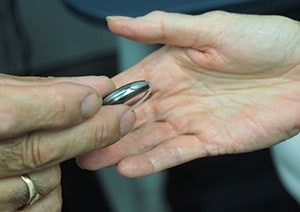As many Americans begin to age, loss of hearing is a common occurrence. More people are dealing with hearing loss than diabetes, cancer, or eyesight issues. There are a few different root causes of hearing loss, but the most common (and permanent) one is occupational. It happens when people are exposed to loud noise or chemicals that damage hearing day in and day out in their jobs over their lifetime.
While it is not one of the most-discussed topics when it comes to aging, it does have a large impact on the quality of life for those dealing with it. The symptoms come on gradually in most cases and hearing loss worsens over time.
Isolation and Depression
Many report that it begins with hearing mumbling when others are talking. They find themselves asking friends and loved ones to repeat themselves often during conversations. This can become frustrating for both individuals in this situation.
This frustration often leads to a lack of communication, which can lead to feelings of loneliness and even depression by the one suffering from the hearing loss. They can begin to feel disconnected from their loved ones and friends.
These feelings can be deepened as the hearing loss progresses and the individual stops being able to enjoy things like their favorite music, the sound of birds chirping in the morning, and other sounds that most people take for granted every day.
Those suffering from hearing loss often feel isolated, left out, and alone, even when gathered with family or friends.
Safety
Hearing loss also presents safety issues that may not be obvious. Many heavy equipment vehicles are equipped with loud alarms to notify pedestrians of their presence.
Hearing the sound of the oven beeping when the food is done cooking, a tea kettle boiling, or even the engine of an oncoming car are all noises that keep us safe. When hearing loss is present, there can be a loss of awareness that can put the individual in danger.
Mental Health
Besides dealing with depression and isolation, those suffering from hearing loss also often show a significant cognitive decline, which can result in memory loss and decreased thinking skills. This is due to the decline of using the hearing-related parts of the brain. As they say, if you don’t use it you lose it.
Many hearing-loss sufferers also report having a ringing in their ears (otherwise known as tinnitus). It can disrupt sleep and concentration, which increases fatigue and affects alertness.
Prevention
Taking preventive safety precautions to protect your hearing is the best way to avoid the negative side effects associated with it. This means wearing proper ear protection in loud situations like construction sites, some concerts, fireworks displays, and more.
However, if you or a loved one are already dealing with early hearing loss, there are several steps to take to ensure the quality of life is not affected:
- Surgery. Some types of hearing loss can be corrected with surgical procedures for eardrum or bone abnormalities causing the hearing loss.
- Hearing aids. These are the most common for the treatment of hearing loss. An audiologist can discuss the potential benefits of using hearing aids as well as fit you with a device.
- Cochlear implants. When hearing loss progresses beyond the point of hearing aids being useful, cochlear implants are usually the next step in the treatment process. This implant bypasses damaged and non-working parts of the inner ear to directly stimulate the hearing nerve.
Talk to Your Doctor
Set up an appointment to speak with your doctor if you suspect yourself or a loved one may be suffering from hearing loss.
Here are some tips from the Mayo Clinic about preparing for your appointment:
- Write down your symptoms and how long you’ve had them. Is the hearing loss in one ear or both? Ask friends and family to help you make the list. They may have noticed changes that aren’t obvious to you, but the changes may be important for your doctor to know.
- Write down key medical information, especially related to any ear problems. Include any chronic infections, injury to your ear, or previous ear surgery. Also list medications, vitamins, or supplements you take.
- Summarize your work history, including any jobs, even those in the distant past, that exposed you to high noise levels.
- Take a family member or friend along. Someone who accompanies you can help you remember all the information from your doctor.
- Write down questions for your doctor.



